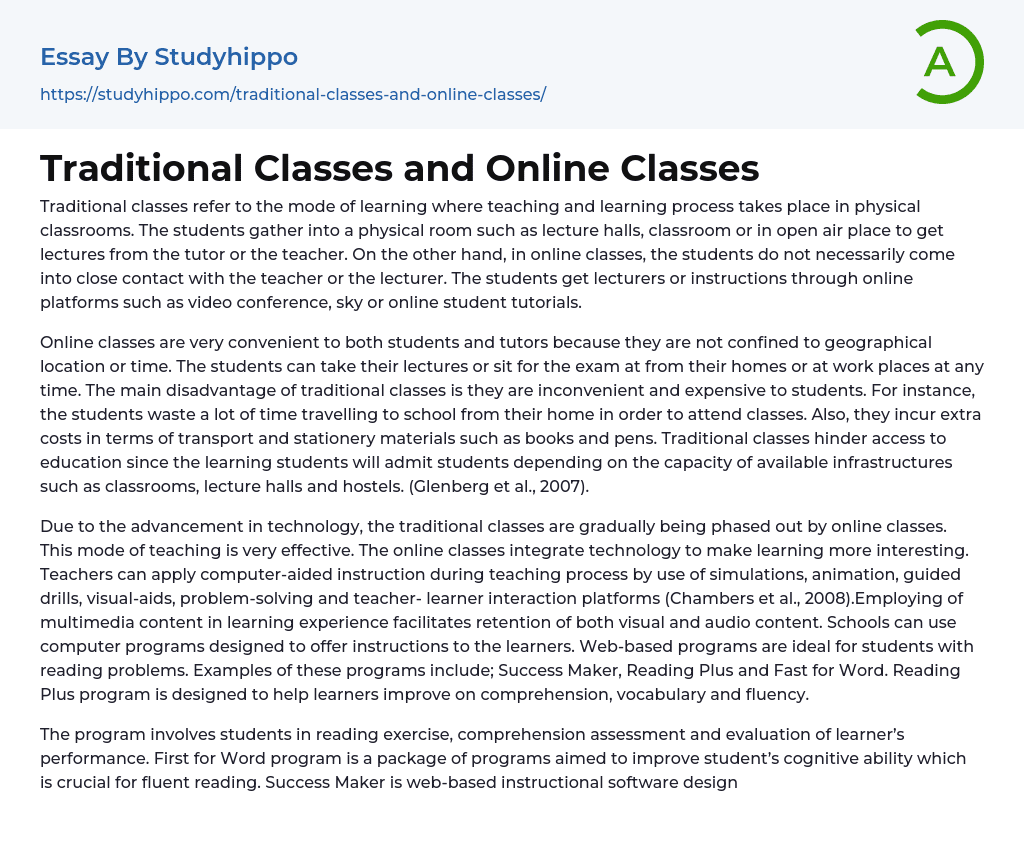Traditional classes involve in-person learning in physical classrooms, such as lecture halls or classrooms. Students gather in a physical space to receive lectures from their teachers. In contrast, online classes eliminate the need for students to be physically present with the teacher or lecturer.
Online platforms such as video conference, sky, or online student tutorials provide students with lectures or instructions. The convenience of online classes for both students and tutors is that they are not restricted by geographical location or time. Students can attend lectures or exams from their homes or workplaces at any time. In contrast, traditional classes are inconvenient and expensive for students. For example, students spend a significant amount of time traveling to school for classes. Additionally, they have extra expenses related to transportation and materials like books and pens.
The traditional way of conducting classes limits access to education because it relies
...on physical resources like classrooms, lecture halls, and hostels. However, online classes are gradually replacing traditional ones due to technological advancements. Online classes leverage technology to improve the learning experience by incorporating computer-aided instruction through simulations, animation, guided drills, visual aids, problem-solving activities, and platforms for teacher-learner interaction. The use of multimedia content in online learning also aids in retaining both visual and audio information (Glenberg et al., 2007; Chambers et al., 2008).
Schools have the option to utilize computer programs that provide instructional support to students. Web-based programs are particularly beneficial for students with difficulties in reading. Some examples of these programs are Success Maker, Reading Plus, and Fast for Word. Reading Plus program aims to enhance learners' comprehension, vocabulary, and fluency. It involves various reading exercises, comprehension assessments, and
the evaluation of students' performance.
First, the Word program is a bundle of programs meant to enhance students' cognitive ability, which is crucial for fluent reading. Success Maker, a web-based instructional software, provides personalized instructions for reading comprehension and mathematics concepts. It also aids learners and tutors in decision making. While these web-based instructional programs are not part of the core curriculums, they offer reading skills to learners who struggle with learning. These software programs can greatly benefit students with disabilities, particularly those with dyslexia. The organization that has solely promoted innovation within their policy has seen technological advancements as their personnel have been equipped with vast knowledge instead of relying on external sources, which can limit creativity and innovation among staff members.
Rapidly growing organizations have a greater need for job analysis compared to stable organizations due to ongoing innovation analysis and testing. It is necessary to ensure efficiency and suitability of the innovation, as well as consider the economic viability of the organization. Thorough analysis is required before full implementation can be achieved. Larger organizations analyze their jobs more extensively than smaller ones, as they require more sophisticated technology to manage their data. Smaller organizations, on the other hand, can make use of simpler technology.
Conclusion
Computer-aided instruction has several benefits compared to traditional teaching methods. It can adapt to the unique needs of students, enabling them to learn at their own speed. Moreover, it encourages active engagement in the learning process by personalizing content based on individual preferences and interests. Additionally, the program offers immediate feedback to learners.
Thus, learners can quickly determine the accuracy of their responses and benefit from improved access to education with this
more efficient program.
References
- Chambers, B., Slavin, R., Madden, N., Abrami, P., Tucker, B., Cheung, A., et al. (2008, September 1).
- Technology Infusion in Success for All: Reading Outcomes for First Graders. Elementary School Journal, 109(1), 1-15. (ERIC Document Reproduction Service No. EJ807714) Retrieved August 7, 2009, from ERIC database.
- Glenberg, A. M., Brown, M., ; Levin, J. R. (2007). Enhancing comprehension in small reading groups using a manipulation strategy. Contemporary Educational Psychology ,32(3),389-399.
- Interpretation essays
- Plagiarism essays
- Analogy essays
- Learning English essays
- Academia essays
- Academic And Career Goals essays
- Academic Integrity essays
- Brainstorming essays
- Brown V Board of Education essays
- Brown Vs Board Of Education essays
- Coursework essays
- Curriculum essays
- Distance learning essays
- Early Childhood Education essays
- Education System essays
- Educational Goals essays
- First Day of School essays
- Higher Education essays
- Importance Of College Education essays
- Importance of Education essays
- Language Learning essays
- Online Education Vs Traditional Education essays
- Pedagogy essays
- Philosophy of Education essays
- Purpose of Education essays
- Scholarship essays
- Study essays
- Studying Abroad essays
- Studying Business essays
- Technology in Education essays
- The Importance Of Higher Education essays
- Vocabulary essays
- Writing Experience essays
- Adhd essays
- Antisocial Personality Disorder essays
- Anxiety essays
- Bipolar Disorder essays
- Depression essays
- Depression And Anxiety essays
- Dyslexia essays
- Learning Disability essays
- Major Depressive Disorder essays
- Mental Disorder essays
- Mental Illness essays
- Psychosis essays
- Schizophrenia essays
- Stress essays
- Suicide essays
- Classroom essays
- College essays




